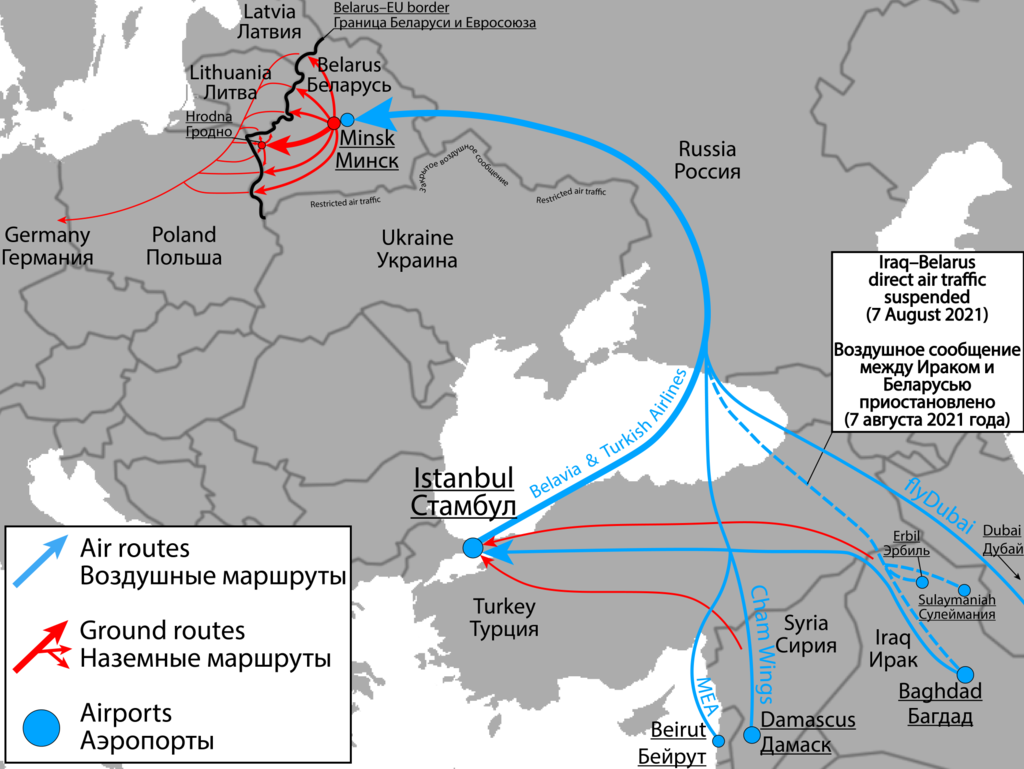Find Luke‘s other articles On Brussels here.
The long-fraught relationship between the EU and Belarus has taken a new, darker turn — one with wide-reaching ramifications for both the EU and Minsk’s ally Moscow.
In the summer of 2020, the EU, led by Lithuania, wholeheartedly backed the pro-democracy protests that swept Belarus in the wake of another rigged presidential election. Authoritarian leader Alexander Lukashenko was “reelected” in a landslide. Then, on 23 May 2021, Ryanair Flight 4978 was forced down in Minsk, with opposition journalist Roman Protasevich and his girlfriend being arrested.
Now, the Belarusian regime has declared something akin to a proxy war on the EU — and is using vulnerable human weapons to wage it.
Minsk has been bringing Middle Eastern migrants, mostly Iraqis, to the country with the promise of a new life in Poland and Germany. These people have then been bussed to Belarus’s borders with its three EU neighbours: Poland, Lithuania and Latvia. They have then been forced to camp by border points.
The three EU members do not want them to enter and Belarusian troops will not let them turn back. They are being left to die on the edge of the EU.
Despite its internal divisions, the EU – from Hungary to the Netherlands – is presenting a united front against Minsk – and is roundly backing the governments in Warsaw, Vilnius and Riga. This is a far cry from the chasm that opened up between Brussels and Warsaw mere weeks ago.
As the EU threatened sanctions, Minsk responded with a threat of its own: shut off the Yamal gas pipeline. The pipeline runs from Siberia to Germany and Austria — and directs right through the middle of Belarus.
But there is another factor in play here: Moscow. Moscow is Minsk’s strongest ally – and is the sole reason why Lukashenko is still in power. Moscow de facto runs the show in Minsk.
Were he to be acting alone, Lukashenko likely would cut off the Yamal pipeline and push even more people towards the EU’s external borders. In Minsk, the heart rules the head — but Putin and his government are far more pragmatic.
Putin is still feeling the aftereffects of his invasion of Ukraine in 2014. His actions resulted in massive sanctions against Russia, a loss of support from some traditional allies like China and Iran and domestic pro-Ukraine protests. The invasion brought Russia to the brink of conflict with NATO.
Now, Putin uses Ukraine as a pawn. Earlier this year, he amassed tens of thousands of troops along the Russia-Ukraine border in order to gain a summit with US President Joe Biden. He now looks to be doing the same thing again.
But Putin’s motivations on Belarus’s EU borders are less clear, especially given the events of 1 November.
On that day, several Belarusian troops entered Poland, crossing a few hundred metres into Polish soil before heading back into Belarus. In response, Poland summoned its Belarusian ambassador to demand an explanation. Some Polish politicians even went as far as to term the events an “invasion”.
Invasion or not, the events of 1 November marked a dangerous escalation — and tensions between Warsaw, and by extension Brussels, and Minsk have not cooled since.
Adding to the urgency of the situation is the fact that Poland is a member of NATO.
NATO (the North Atlantic Treaty Organisation) has a common defence policy. This means that, if one member were to be attacked, all other members must come to its aid. NATO includes some of the world’s largest and most powerful militaries, including the US, the UK, France and Turkey. Warsaw is unlikely to trigger the common defence clause, but NATO remains on high alert at the Poland-Belarus border.
Any conflict between NATO and Belarus would inevitably involve Russia on the side of Minsk. Putin is no fool – he will not want to drag his country into direct war with NATO. Although NATO leaders may be feeling wary of Minsk and Moscow, any real threat of military escalation between Warsaw and Minsk is unlikely to bear fruit.
In time, tensions between Minsk and the EU capitals of Warsaw, Vilnius and Riga will likely cool once again. But this episode does bring home an uncomfortable truth for Brussels. The leader of one it’s direct neighbours is a despot – one who will not be swayed by sanctions or isolatory measures.
The fact that Lukashenko has been able to rile Warsaw, in particular, to this point, means that sending human weapons to the border might just be the first part of the new, more dangerous relationship that Brussels and Minsk now share.

